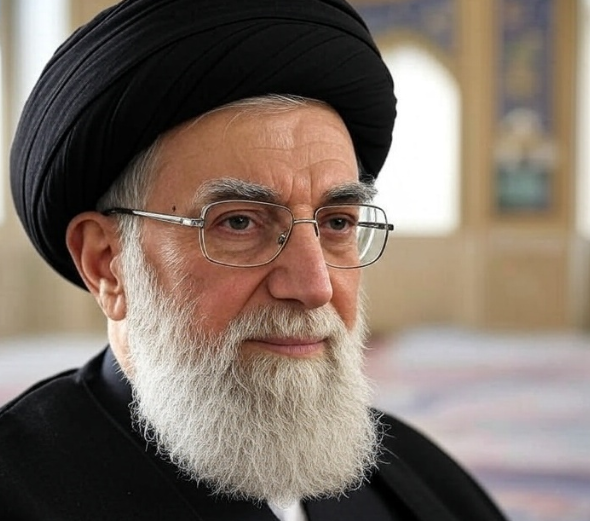Khamenei Vows Bitter and Painful Retaliation:Tensions erupt as Israel launches a fresh wave of airstrikes on IRGC targets deep inside Iran, prompting Supreme Leader Ayatollah Khamenei to vow a “bitter and painful” retaliation. With negotiations halted and Netanyahu hinting at deeper strategic goals—including possible regime change—the Middle East stands on the edge of a wider conflict. As Iran prepares its missile and drone arsenal, experts warn that the next 48 hours could reshape regional geopolitics.
Khamenei Vows Bitter and Painful Retaliation
In a dramatic and highly charged development, the Israeli Defense Forces (IDF) have confirmed a fresh wave of strikes targeting IRGC (Islamic Revolutionary Guard Corps) terror targets inside Iran. According to Iranian media, the renewed attacks have hit areas including the city of Tabri, marking yet another escalation in the already volatile relationship between the two archrivals. The strikes come shortly after a stern warning from Iran’s leadership promising painful retaliation for any further Israeli aggression.
Tensions had been building for weeks, but this latest round of airstrikes seems to have disrupted an already fragile diplomatic track. Former Ambassador of india Anil Suri said on the developments, that irony that negotiations between Israel and Iran were underway in Oman just before the strikes took place. “Negotiations were already happening… and they’ve now been disrupted,” he said. While stressing the importance of dialogue, Ambassador Suri acknowledged that real negotiations may only begin after both sides feel they have achieved some of their strategic or symbolic objectives.
The situation raises an important question about Israel’s ultimate goal. According to Ambassador Suri, there are two possible endgames: either delaying Iran’s nuclear ambitions by a few years or initiating a broader plan aimed at regime change. Israeli Prime Minister Benjamin Netanyahu’s recent remarks have hinted at deeper intentions, including appeals directed at the Iranian populace—a move that has raised eyebrows among international observers.
Meanwhile, reports from Tehran indicate that Iran is preparing for retaliation. Ambassador Suri highlighted Iran’s military capabilities, pointing out its arsenal of cruise missiles, ballistic missiles, and combat drones—many of which have been tested and proven effective in the ongoing Russia-Ukraine war. However, he also emphasized the logistical and tactical challenges Iran would face in targeting Israel. The geographic distance, combined with Israel’s cutting-edge air defense systems, including the Iron Dome and David’s Sling, makes a direct and significant blow difficult to deliver.
Still, war scenarios are unpredictable. Citing lessons from India’s Operation Shindura following Pulwama, Ambassador Suri reminded viewers that conflict zones are often full of strategic surprises. “Never say never,” he cautioned, adding that the next 24 to 48 hours could bring unexpected developments.
When comparing the current hostilities to last year’s conflict, Ambassador Suri pointed out significant changes in the regional power dynamics. He noted that Israel appears to have chosen this timing strategically. Iran’s regional proxy, Hezbollah, has been substantially weakened since the 2024 clash. While Hezbollah may still retain some offensive capabilities, its operational capacity has notably diminished. Furthermore, Iran’s own air defense systems were considerably damaged during the previous year’s assault, and its military and economic strength appears to be at its weakest point in over a decade.
These factors may have influenced Israel’s decision to act now. With a weakened Iran and what many view as unwavering support from U.S. President Donald Trump, Israel appears to be capitalizing on the moment to assert its strategic objectives. The coordinated strikes on key IRGC facilities suggest a well-calculated effort to set back Iran’s military infrastructure and possibly its nuclear program.
Meanwhile, Mohammad Bagher Ghalibaf, Speaker of the Iranian Parliment: the time for revenge has arrived — and this revenge will be exacted by any means and through any method necessary.
further Foreign Ministry, Islamic Republic of Iran say:
“In the Name of God, the Most Gracious, the Most Merciful Noble People of Iran, Fellow Iranians, Our beloved homeland, Iran, has been unjustly attacked by a criminal and evil regime. This morning, the occupying and rogue Zionist Regime violated the territorial integrity and national sovereignty of our dear Iran, attacking several locations, including residential areas in Tehran and other cities across our country. As a result, a number of the noblest and most patriotic servants of the nation – those who defended Iran’s dignity, sovereignty, and advancements in science and technology – along with other innocent civilians, were martyred.
The Ministry of Foreign Affairs extends its congratulations and condolences to the Revered Leader and the noble people of Iran on the martyrdom of these defenders and servants of the homeland, who sacrificed their lives for our nation in the face of the Zionist regime’s unforgivable crime. The Zionist regime’s attacks on Iran constitute a violation of Article 2(4) of the UN Charter and a blatant act of aggression against the Islamic Republic of Iran. In accordance with Article 51 of the UN Charter, Iran reserves the legitimate and legal right to respond to this aggression. The Armed Forces of the Islamic Republic of Iran will not hesitate to defend Iran’s sovereignty with full strength and in the manner they deem appropriate.”
As the dust settles on the initial phase of this renewed confrontation, the global community watches anxiously. Will Iran respond with a show of force, or will backchannel diplomacy resume? What remains clear is that the situation in the Middle East has reached a critical inflection point—one that could determine the region’s geopolitical trajectory for years to come.
Disclaimer:
This article is based on ongoing developments and publicly available information from news reports and expert commentary. Geopolitical situations are highly fluid and may evolve rapidly. While every effort has been made to present accurate and balanced reporting, readers are advised to follow official sources and trusted media outlets for the latest verified updates. The views expressed by individuals quoted in this article do not necessarily reflect the views of this platform.

